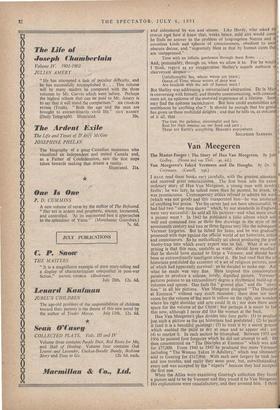Sounds and Sweet Airs
Winged Chariot.. By Walter de la Mare. (Faber. los. 6d.) HE sits by himself, talking to himself ; and that inward companion replies to him. The subject to be unriddled is the enigma of Time —" the subtlest of confusions known to Man." The procedure is confidential and unassuming. The pervading character of the verso is colloquial—intimately and compellingly colloquial (akin, one :observes, to the early seventeenth century—Samuel Daniel, for CxamPle, though the idiom is inimitably his own and frequently alert with most endearing spryness). Occasionally its quality is almost homespun—appropriately so, since in these passages he is speaking the language of the heart, which is exempt from felicitous ingenuities. The tone of voice is subdued, vibrant with that depth Of meaning which haunts the words. Incapable, as always, of being solemnly oracular, yet in this poem he speaks as one shoWing us a mystery. More than ever, he is a minister of grace. Gently and indirectly, he reminds us, as Francis Thompson did, that "the drift of pinions, would we hearken, beats at our own clay-shutter'd doors." The word-magician is behind it all, mantically exploring the universe of Self and its seemingly unchartable apprehensions—
Heeded perceptions of a secret mind Less closely to the physical confined: Like flowers in their beauty to the blind.
Steering by the compass of common sense, he matches reason with insight—reason with his pilot's certificate, and insight absent- mindedly overhearing " the soundless thunder of the distant weir which is Eternity." And so, for more than sixteen hundred all-welcome. lines, one experiences a mind journey with his voice. Questioning, surmising, speculating, imagining, he gives us the mellowed plenitude (and to some extent a self-portrait) of his matchlessly enquiring yet medita- tive mind. " Why this absurd concern with clocks, my friend 7 " he begins, observing himself returning to his silent rooms and at once winding up the docile things, setting them fifteen minutes fast, as cautious mortals ought, and thus being " in Time's sly coggery
caught." But from the dull demands of these mechanisms he seeks escape.
Think you Man's "enemy" is thus put by? Think you so fleet a thing—that madcap hare You daily waken from its nightlong lair— Time, would consent such stratagems to share?
Yet he admits that, as a child, he fell in love with clocks, and puts in an affectionate word for his " much-prized old dial, sun-pen- dultim'd in gilt," and for the grandfather clock at the head of the stair.
Pause, as you go to bed ; to listen.; and share The unhastening monologue it ponders there.
In the homely hour-glass, however, be finds a more solacing measure- ment of mutability.
A subtler language stirs in whispering sands....
Travelling yet further from the autocracy of Greenwich, he notes how
The dwindling candle with her pensive light Metes out the leaden watches of the night. And, in that service, from herself takes flight.
And he warns himself that only through non-attention to "the time" can he gain that blest reverie
When from the serfdom of this world set free, The self a moment rapt in peace may be
Or "Time's not of moments made," he tells us. " It's hidden in some nameless stuff that oozes in between."
At first sight Winged Chariot appears to be a miscellany of Shortish poems, loosely connected with the central theme. Closer study reveals that each sub-Section leads to the next, though the links uniting them are felt rather than discerned. The transitions are always appropriate to the progress of the poem, which provides diversity of eye-opening imageries, fresh-minted ideas, and lovely ,!ayings. And, as ever, he makes familiar things unique for our newly heightened consciousness of them.
Life's dearest mysteries lie near, not far. The least explored arc the familiar ; As, to a child, the twinkling of a star ;
and calendared by sun and season. Like Hardy, who asked tl crocus Not how it knew that, weeks hence, mild airs would corn he finds'no answer to the problem of languageless Nature and i countless kinds and spheres of consciousness, obedient to son obscure decree, and " supremely blest in that by human cares the are unoppressed."
• Time with an infinite gentleness through them flows. . . . And, presumably, through us, when we allow it to. For he wont I think, regard as an exaggeration Shelley's superb outburst clairvoyant despair—
Unfathomable Sea, Whose waves are years ; Ocean,of Time, whose waters of deep woe Are brackish with the salt of human tears !
But Shelley was addressing a universalised abstraction. De la Mai is conversing with himself, and thereby communicating, with consun mate art, an epitome of the matured experience of a lifetime. Son may find the epitome inconclusive. But how could mutabilities an semblances be anything else ? It should be enough that his genii has given us these multifold delights ; and that he tells us, as outcotr of it all, that
The true, the guileless, meaningful and fair, Rest for their essence on our heed and care ; These are Earth's everything, Heaven's everywhere.
SIEGFRIED SASSOON.























































 Previous page
Previous page